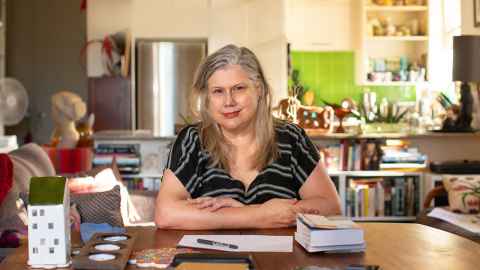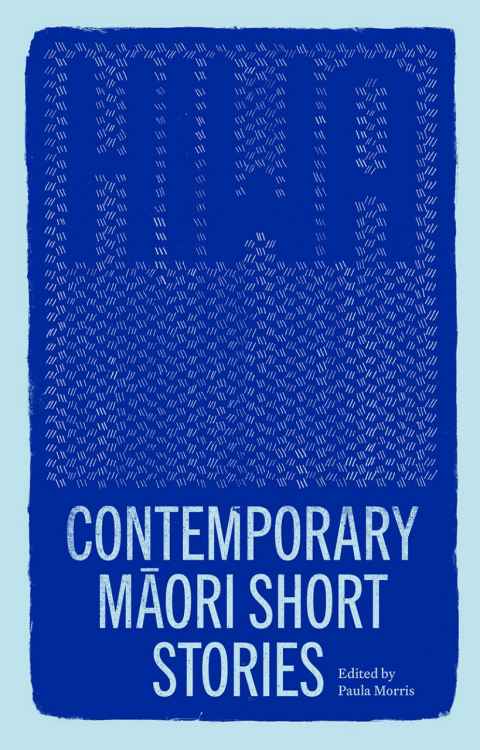Paula Morris: new anthology's fresh approach to Māori short stories
1 August 2023
Such was the talent, it was a challenge for editor Paula Morris to whittle down the short stories of 27 Māori writers for an anthology, Hiwa.

How Associate Professor Paula Morris gets time to write anything is anyone’s guess.
This month she adds another offering to New Zealand’s literary landscape, after a challenging selection process to narrow down selected Māori authors’ short stories into a new anthology.
As well, she is keeping several Aotearoa literature websites ticking over, ensuring this country’s writing, and reviews of it, are accessible, including the recently launched Aotearoa New Zealand Review of Books site, developed with seed money from the Faculty of Arts.
There’s also Wharerangi, the Māori literature hub (maorilithub.co.nz), conceived a few years ago and funded by Creative New Zealand, which contains multiple resources for all writers, such as contests to enter and publishers to contact.
Paula (Ngāti Wai, Ngāti Manuhiri, Ngāti Whātua), who is the director of the University of Auckland’s highly respected Master of Creative Writing Programme, has just added to the body of work available for lovers of local literature. She has edited an anthology Hiwa: Contemporary Māori Short Stories (Auckland University Press), launching on 10 August. The Hiwa refers to Hiwa-i-te-rangi, the ninth star of Matariki, signifying vigorous growth and dreams of the year ahead.
“I’ve been working on it for a long time so I’m very excited to see it being published at last. These are contemporary Māori short stories and all 27 writers are alive.”
Four stories are written in te reo, and consulting editor Darryn Joseph (Ngāti Maniapoto) assisted with those, while the rest are written in English, including one by Paula. The anthology includes big names people are familiar with, such as Witi Ihimaera and Patricia Grace, but being well-known wasn’t the criterion for this book.
“There are other names readers may know, such as Tina Makereti, Alice Tawhai and Becky Manawatu, but many are emerging writers publishing fiction in print for the first time.
“There’s a substantial introduction in the book to contextualise the writing of this selection of Māori short fiction and also a short introductory essay for each writer with some context for the story itself.”
Paula wanted her anthology to include a range of writers, styles, subjects and points of view.
“I wanted an anthology where there was no particular kaupapa to the stories, and where people weren’t expected to write in a particular style or to a particular theme. The Huia story anthologies are good, but they only include writers – mostly emerging names – who’ve entered the Pikihuia writing contest that year.”
“The idea is that Hiwa is about Maori writers, not about Māori subjects or imposing a mātauranga Māori lens on the whole project.”
The idea is that Hiwa is about Maori writers, not about Māori subjects or imposing a mātauranga Māori lens on the whole project.
Some stories are new work and some have been published before, but in many instances appear in revised form partly, Paula admits, because of her “intrusive editorial bossiness”.
The editorial process included an open call for submissions in te reo or in English, as well as direct commissions. The open call drew around 120 stories by Māori writers in New Zealand or based overseas. “Some of the writers who submitted via the open call were known to me, like David Geary, who’s an accomplished dramatist and fiction writer based in Canada. But with many of the writers, I was reading their work for the first time. So that was exciting.”
Paula is all about giving budding writers opportunities, with up to 12 admitted to the Master of Creative Writing Programme every year. Some of them are included in Hiwa, including well-known flash-fiction author Jack Remiel Cottrell, Commonwealth Story Prize finalist Shelley Burne-Field, and recent graduate Pamela Morrow, now a PhD student at the University.
Boosting opportunities was also part of the reason Paula became involved in Wharerangi. The website is a trove of information for and about contemporary Māori writers of poetry, fiction and non-fiction.
“It was conceived at a national Māori writers’ hui where I realised so many emerging writers have no idea where they can get their work published, what opportunities are available, what contests they can enter, what residencies they can apply for.
"There was a lot of misunderstanding about publishers as well. People would say to me, ‘Publishers aren’t interested in Māori writers or Māori books.’ Well, the absolute opposite is true.”
She says the site is also useful for non-Māori writers, because it enables them to find Māori work easily and see who’s publishing what.
“It can be accessed by anyone in the world and I hope it’s a way for people outside New Zealand to find out more about our great writers.”
People would say to me, ‘Publishers aren’t interested in Māori writers or Māori books.’ Well, the absolute opposite is true.
Paula is also passionate about the art of reviewing books. With many media publications getting rid of specialist book critics, she’s helping develop the art of long-form book reviewing among writers through the new Aotearoa New Zealand Review of Books (ANZRB) website (nzreviewofbooks.com).
The site now has a relationship with the New Zealand Listener, with some of its reviews published in edited versions in the print magazine before the long form appears on the ANZRB site.
“It’s a challenge in New Zealand to get lengthy review coverage, in-depth and well-written, of local books. That’s what the review site is about.
“As part of the Faculty of Arts’ support for this initiative, I ran webinars on the art and craft of reviewing and offered mentorships with experienced review editors. Initially, this was for our own PhD students and our MCW alumni.
“But I’ve just received more funding, this time from the Mātātuhi Foundation, so I can put out a call nationally and offer the webinars and mentorships to people around the country.”
The goal is to develop writers of well-argued reviews, not people just talking about what they can relate to personally.
“People probably don’t really care what you think unless you create an argument and use quotes from the book to back it up. Reviewers need to have the confidence not only to express their views, but to be able to support them, giving evidence. You’re also trying to write something that is interesting and well-crafted in itself so people don’t get bored after the first paragraph.”
Paula Morris can be heard in a new fortnightly Faculty of Arts podcast called Research and Reason on Spotify, Amazon, Apple and Google.

This story first appeared in UniNews August 2023.